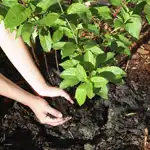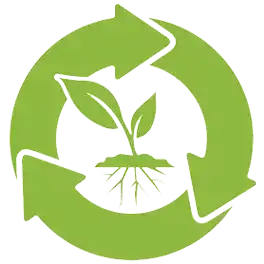Backyard Composting
 By combining composting with recycling, you could divert almost 70% of your waste from going into the landfill. Composting is a process that accelerates the natural decaying process of yard and organic waste, such as yard trimmings, leaves and food scraps. Compost is the end result of the decaying process. It is a rich material that can help your plants absorb nutrients and it increases soil aeration and water holding capacity.
By combining composting with recycling, you could divert almost 70% of your waste from going into the landfill. Composting is a process that accelerates the natural decaying process of yard and organic waste, such as yard trimmings, leaves and food scraps. Compost is the end result of the decaying process. It is a rich material that can help your plants absorb nutrients and it increases soil aeration and water holding capacity.
How Can I Begin Composting?
To begin composting, you will need a compost bin (composter) to place your scraps in. This can be as simple as chicken wire or a wooden compost bin. You can even cut the bottom out of a plastic trashcan and drill small holes on the sides.
A variety of composters including tumblers, worm composters, and compost bins are available at local home and garden businesses.
To create a compost pile:
- Find a level spot in the corner of your yard about three to five-feet square.
- Pile yard trimmings, leaves and fruit and vegetable food scraps.
- Keep the pile moist -- not soggy -- by watering it occasionally.
- Stir with a pitchfork or stick every few weeks to circulate air (without air, the decomposition process slows) and distribute moisture evenly.
- You will know your compost is done when it becomes a dark material that is uniform in texture. It will take several months.
What Can Be Composted?
What can be composted depends on what type of bin you use for composting.
In general:
- Yard trimmings, including weeds, vines, leaves, plant stalks, twigs, and branches.
- Food waste like fruit scraps, vegetable scraps, coffee grounds, stale bread and egg shells.
- Other items including straw, feathers, wood ashes, sawdust, plants and most paper in small quantities.
Depending on what kind of composter you have, be careful when putting meat, bones, dairy or fat. These could attract pests.
Resources
Composting Tips
- Mixing lets the items help each other decompose. So make sure to mix it all up.
- Don't be surprised by the bugs and heat. That is all a part of the process.
- Buy some red wiggler worms. They help aerate the pile and make richer compost.
For more yard waste recycling tips, please visit Clemson Cooperative Extension for more yard waste recycling tips from the Clemson Cooperative Extension.
Visit the S.C. Department of Health and Environmental Control's
Compost Calculator
Please enter the measurements below and press "Calculate" to receive the approximate amount of compost needed for the specified area.
Calculate
Suggested Amount
The suggested amounts below display the compost needed in cubic yards, cubic feet or bags. All three options depict the same total amount of compost needed. Please choose the measurement that best fits your needs.
NOTE: The fields below cannot be edited.

Charleston County
ChasCountyGov
ChasCountyGov
Charleston County Government
CharlestonCountyGovernment
CharlestonCountyGovernment
CharlestonCountyGov
ChasCountyGov